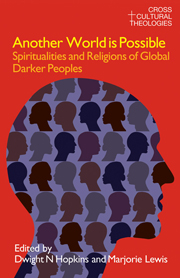Book contents
- Frontmatter
- Dedication
- Contents
- Acknowledgements
- Contributors
- Introduction
- Part I India
- Part II Japan
- Part III Australia
- Part IV Hawaii
- Part V England
- Part VI South Africa
- Part VII Botswana
- Part VIII Zimbabwe
- Part IX Ghana
- Part X Cuba
- Part XI Jamaica
- Part XII Brazil
- Part XIII USA
- 23 Womanist Theology and Epistemology in the Postmodern U.S. Context
- 24 A Home-place: Self-identity and God in African American Culture
- 25 Black Christian Worship: Theological and Biblical Foundations
- Endnotes
- Select Bibliography
- Index of Subjects
- Index of Names
24 - A Home-place: Self-identity and God in African American Culture
from Part XIII - USA
- Frontmatter
- Dedication
- Contents
- Acknowledgements
- Contributors
- Introduction
- Part I India
- Part II Japan
- Part III Australia
- Part IV Hawaii
- Part V England
- Part VI South Africa
- Part VII Botswana
- Part VIII Zimbabwe
- Part IX Ghana
- Part X Cuba
- Part XI Jamaica
- Part XII Brazil
- Part XIII USA
- 23 Womanist Theology and Epistemology in the Postmodern U.S. Context
- 24 A Home-place: Self-identity and God in African American Culture
- 25 Black Christian Worship: Theological and Biblical Foundations
- Endnotes
- Select Bibliography
- Index of Subjects
- Index of Names
Summary
Introduction and Purpose
Spiritual kinship transcends all other relations. The race problem will be solved when Christianity gains control of the innate wickedness of the human heart, and men learn to apply in dealing with their fellows the simple principles of the Golden Rule and the Sermon on the Mount.
Self-identity is the crucible that impacts all other aspects of the life of an individual and a community. This theme will be used to look at the Black experience in America as an example of how a community can lose its identity and connection to the source in response to crisis, but can also regain it.
Identity begins in the womb through a connection to God and to the fellowship of humankind. Humans are connected, and according to Jung, there is a sharing of consciousness between members of the human race and the Creator that is stronger than anything else. Thurman also states, “there is an affinity between man's own consciousness and the many forms of consciousness around him…there is such a thing as a general experience of life that two forms may share at the same moment in time without resistance and without threat.”
Consider, for purposes of heuristics, the complete coexistence of humankind as a metaphorical “Garden of Eden” experience. Bound through their “shared consciousness,” humans live side-by-side in community and in peace. The center of this community is a connection to a higher creative source. However, in every Garden of Eden, there is a serpent.
- Type
- Chapter
- Information
- Another World is PossibleSpiritualities and Religions of Global Darker Peoples, pp. 313 - 330Publisher: Acumen PublishingPrint publication year: 2009



